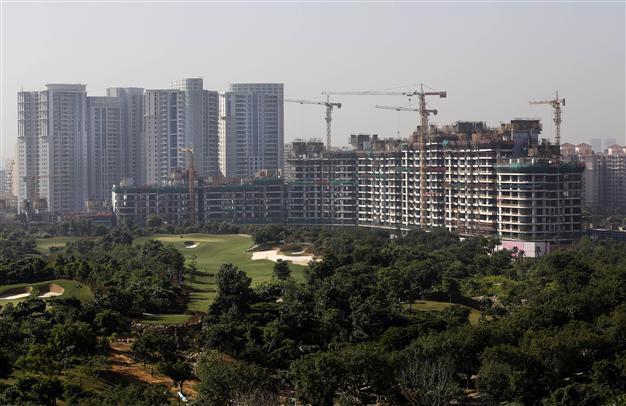IMF again cuts growth forecasts for 2015, 2016
LIMA

A view of an under construction residential building complex in Gurgaon, a suburb of New Delhi, India, Wednesday, Sept. 30, 2015. AP Photo
The International Monetary Fund (IMF) has trimmed its expected global growth forecasts for 2015 and 2016 again, warning that downside risks to the global economy would appear due to the weaker prospects for emerging market economies and oil-exporting countries.
The IMF, whose annual meeting starts in Peru this week, forecast that the global economy would grow at 3.1 percent this year and by 3.6 percent in 2016.
Both new forecasts are 0.2 percentage points below its July forecast and 0.4 and 0.2 percentage points below its earlier outlook in April, respectively.
“Prospects across the main countries and regions remain uneven. Relative to last year, the recovery in advanced economies is expected to pick up slightly, while activity in emerging market and developing economies is projected to slow for the fifth year in a row, primarily reflecting weaker prospects for some large emerging market economies and oil-exporting countries. In an environment of declining commodity prices, reduced capital flows to emerging markets and pressure on their currencies, and increasing financial market volatility, downside risks to the outlook have risen, particularly for emerging market and developing economies,” it said.
Among major economies, the U.S. is expected to grow by 2.6 percent in 2015 and by 2.8 percent in 2016, while the eurozone is forecast to grow by 1.5 and 1.6 percent, respectively.
The IMF, however, sees growth in China slowing to 6.8 percent this year and 6.3 percent in 2016.
The biggest hit to growth will come in emerging economies where the IMF cut its growth forecast to 4 percent in 2015, due to a sharp slide in commodity prices, according to the fund.
The IMF also slashed its GDP forecast for Turkey from 3.1 to 3 percent for 2015 and from 3.6 percent to 2.9 percent for 2016.
“The emerging and developing region has benefited from lower oil prices and the gradual recovery in the eurozone, but is also affected by the contraction in Russia and the impact of still-elevated corporate debt on investment. The latter, together with political uncertainty, is expected to weigh on domestic demand in Turkey, where the growth of activity is projected to remain at about 3 percent in 2015-16,” it said.
